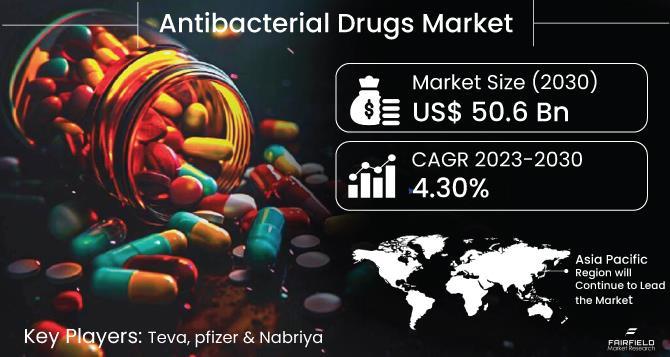Antibacterial Drugs Market
The global antibacterial drugs market is set to achieve substantial growth, with revenues reaching US$70.6 billion by 2030, up from US$50.6 billion in 2023. This growth reflects a stable compound annual growth rate (CAGR) of 4.3% between 2023 and 2030, highlighting the market's resilience amid evolving healthcare challenges.

For More Industry Insight: https://www.fairfieldmarketresearch.com/report/antibacterial-drugs-market
Addressing Global Health Challenges
The antibacterial drugs market plays a crucial role in combating infectious diseases, driven by the increasing prevalence of antibiotic-resistant strains and the persistent emergence of new infectious diseases. Key market drivers include population growth, urbanization, and heightened healthcare awareness, which collectively elevate the demand for effective antibacterial treatments.
Market Dynamics and Innovation
Infectious diseases ranging from common respiratory infections to life-threatening conditions continue to propel market growth. This demand necessitates addressing a wide spectrum of bacterial pathogens, including both Gram-positive and Gram-negative bacteria. The market witnesses ongoing innovation as pharmaceutical companies invest in research and development to develop novel drugs targeting resistant strains, addressing a critical global health challenge.
Regional Insights and Competitive Landscape
North America and Europe currently dominate the global antibacterial drugs market, owing to advanced healthcare infrastructures and high incidences of infectious diseases. However, Asia-Pacific emerges as a key growth region due to increasing healthcare expenditures and rising infectious disease burdens. The market remains competitive, with leading
pharmaceutical firms engaging in strategic partnerships, acquisitions, and product launches to maintain market dominance.
Challenges and Opportunities
Challenges such as high drug development costs, regulatory hurdles, and evolving bacterial resistance continue to impact market dynamics. However, opportunities lie in personalized medicine approaches, precision therapies, and collaborative efforts to address global health concerns effectively. The integration of artificial intelligence in drug discovery further accelerates innovation, promising significant advancements in antibacterial therapies.
